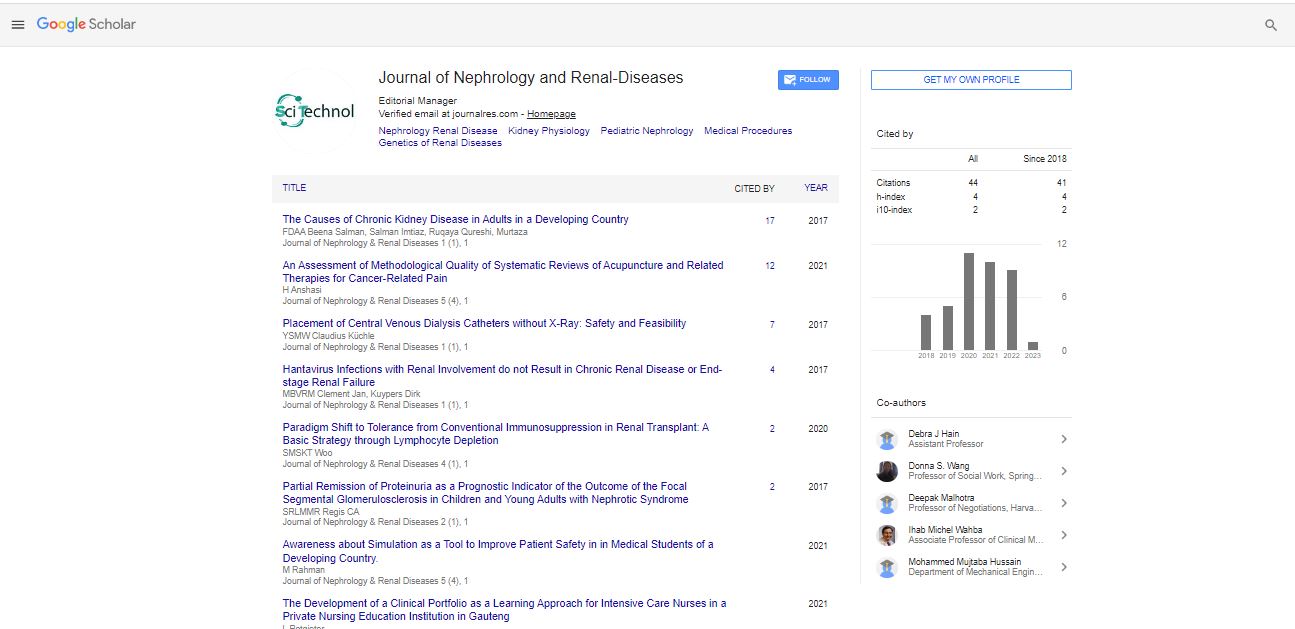Opinion Article, J Nephrol Ren Dis Vol: 7 Issue: 1
Advancements in Pediatric Nephrology: A Comprehensive Review
Mathieu Gaudreault*
Department of Physical Sciences, Peter MacCallum Cancer Centre, Melbourne, Victoria 3000, Australia
*Corresponding Author: Mathieu Gaudreault
Department of Physical Sciences, Peter MacCallum Cancer Centre, Melbourne, Victoria 3000, Australia
E-mail: mathieu.g2429@petermac.org
Received date: 20 February, 2023, Manuscript No. JNRD-23-96400;
Editor assigned date: 22 February, 2023, PreQC No. JNRD-23-96400 (PQ);
Reviewed date: 09 March, 2023, QC No. JNRD-23-96400;
Revised date: 16 March, 2023, Manuscript No. JNRD-23-96400 (R);
Published date: 23 March, 2023, DOI: 10.4172/2576-3962.1000019.
Citation: Gaudreault M (2023) Advancements in Pediatric Nephrology: A Comprehensive Review. J Nephrol Ren Dis 7:1.
Description
Pediatric nephrology is a specialized field of medicine that focuses on the diagnosis, treatment, and management of kidney disorders in children. Over the past few decades, significant advancements have been made in our understanding of pediatric nephrology, leading to improved diagnosis, treatment, and outcomes for children with kidney diseases. This manuscript provides a comprehensive review of the recent advancements in pediatric nephrology, including advances in diagnosis, management, and research findings in various kidney disorders commonly encountered in the pediatric population.
Pediatric nephrology encompasses a wide range of kidney disorders that affect infants, children, and adolescents. These disorders can be congenital or acquired and may involve the kidneys themselves or the urinary tract. Common conditions seen in pediatric nephrology include Congenital Anomalies of the Kidneys and Urinary Tract (CAKUT), glomerular diseases, tubulopathies, renal tubular acidosis, nephrotic syndrome, acute kidney injury, chronic kidney disease, urinary tract infections, and renal transplantation.
Advancements in diagnosis
Accurate diagnosis is crucial for the management of kidney disorders in children. Advances in diagnostic tools have significantly improved the ability to identify and characterize various kidney diseases. Imaging modalities such as ultrasonography, Magnetic Resonance Imaging (MRI), and Computed Tomography (CT) scans have become more sophisticated, allowing for better visualization of the kidneys and urinary tract. These imaging techniques aid in the diagnosis of congenital anomalies, cystic kidney diseases, and other structural abnormalities.
In addition to imaging, genetic testing has revolutionized the diagnosis of many pediatric kidney diseases. Advances in molecular genetics have led to the identification of numerous genetic mutations associated with kidney disorders, such as autosomal dominant and autosomal recessive polycystic kidney disease, Alport syndrome, and nephronophthisis, among others. Genetic testing has not only improved the accuracy of diagnosis but also helped in predicting disease progression and identifying potential candidates for targeted therapies.
Advancements in management
Management strategies for pediatric kidney diseases have evolved significantly in recent years. Conservative management, including dietary modifications and pharmacological interventions, remains an important part of the management of many kidney disorders in children. However, advancements in medical and surgical interventions have expanded treatment options and improved outcomes.
Immunosuppressive therapies, such as corticosteroids, calcineurin inhibitors, and other immunomodulatory agents, have shown significant efficacy in treating glomerular diseases, such as nephrotic syndrome and glomerulonephritis. The development of novel targeted therapies, such as rituximab, has also shown promising results in certain cases.
Surgical interventions, including nephrectomy, nephron-sparing surgeries, and renal transplantation, have also evolved significantly in recent years. Laparoscopic and robotic-assisted surgeries have become more commonly used, leading to reduced morbidity and shorter hospital stays for children undergoing kidney surgery. Renal transplantation has emerged as a definitive treatment option for endstage renal disease in children, with improved graft and patient survival rates due to advances in immunosuppression and surgical techniques.
Advancements in research
Research in pediatric nephrology has expanded our understanding of the pathophysiology and molecular mechanisms underlying various kidney diseases in children. Basic science research has led to the discovery of new biomarkers for early diagnosis and prediction of disease progression. Advances in proteomics and genomics have unraveled the complex genetic and molecular pathways involved in kidney development and function.
Clinical research has also contributed to the development of evidence-based guidelines for the management of pediatric kidney diseases. Randomized Controlled Trials (RCTs) have provided valuable insights into the efficacy and safety of various treatment strategies. Long-term follow-up studies have shed light on the natural history of kidney diseases.
 Spanish
Spanish  Chinese
Chinese  Russian
Russian  German
German  French
French  Japanese
Japanese  Portuguese
Portuguese  Hindi
Hindi 
